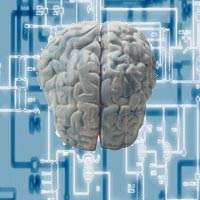Recently Don Spanton and Nate Barna hit on one of the topics I struggle with almost daily. To summarize: Don has taken the position that biotechnology is the route by which the low hanging fruit can be harvested to accelerate progress towards increased longevity the fastest. Nate takes the position that increasing intelligence is the more profitable route. Given a common goal set of increasing personal survival, I'm curious what people think about where the critical levers are in the science/engineering/computation fields.
Currently I work very much on the biology/bioengineering side of neural interfacing, but at the end of the Summer, I will probably jump headlong into the computational world (I'm most likely going to transfer to a PhD program in AI). From my assessment of neuroscience we are at a point where we don't need a great deal more information to begin robustly modeling cortical information processing. I see understanding this type of processing as one of the key problems that will open gates in multiple fields (increased human intelligence, AI, and hence all other fields of human endeavor - especially those fields that require understanding of highly complex systems).
To give you my personal perspective: I was trained as a molecular biologist (MS in molecular neuro), worked as a biotech analyst for a while, have been in neuroengineering for three years, but now am convinced that computational modeling of large scale biological neural networks might be the field where I can make the greatest impact. A lot of this has to do with my particular strengths, which play towards synthesizing large amounts of data, but I think there may be a shortage of system level thinkers in many fields which may be slowing progress on all fronts down.
In addition, I believe biotech in particular suffers from a lack of systematic thinking with regards to how experiments are carried out. Efforts such as Aubrey de Grey's SENS and the up and coming culture of bioengineering will likely change the outlook somewhat, but the current culture (slow progress due to over-regulation, lack of systematic thinking, lack of investment of research dollars in critical targets) is likely to not go down without a fight.
I will be interested to hear people's opinions




















































